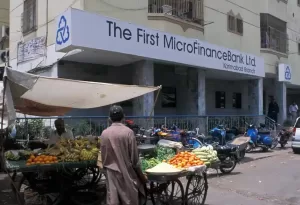Latest News
What are the requirements for setting up Microfinance Bank in Nigeria?
You might be wondering how much you need to start up a Microfinance Bank, or you are wondering what are the requirements for setting up Microfinance Bank in Nigeria?

You might be wondering how much you need to start up a Microfinance Bank, or you are wondering what are the requirements for setting up Microfinance Bank in Nigeria? Worry no more, because this article explains everything you need to know about setting up a Microfinance bank in Nigeria.
Meanwhile, a microfinance bank refers to a mini or non-commercial bank licensed by the Central Bank of Nigeria (CBN) to provide financial services and non-financial services.

The CBN is the government agency in charge of licensing microfinance banks in Nigeria.
However, there are several requirements for registering a microfinance institution in Nigeria. Before a microfinance bank license can be issued, the applicant is expected to fully comply with the CBN’s laid down principles and regulations.
Types Of Microfinance Banks In Nigeria
The CBN guidelines classify Microfinance Bank into 3 categories:
- UNIT MICROFINANCE BANK: This type of microfinance bank requires at least N20,000,000 (Twenty Million Naira as a capital base to start up and it is not permitted to operate by opening branches or money centres apart from the main bank office.
- STATE MICROFINANCE BANK: This is a lot higher than the unit microfinance bank. It requires a minimum of N100,000,000 (One Hundred Million Naira) in the capital base to start. It requires approval by the Central Bank of Nigeria to operate in the same state when a new branch wants to open.
- NATIONAL MICROFINANCE BANK: This requires the highest cash as startup capital than the first two mentioned above. A sum of N2,000,000,000 (Two Billion Naira) is required to start a microfinance bank in this category. It can, however, operate in all states of the country, although it must be approved by the CBN for each branch that is to be opened.

Licensing Requirement for Microfinance Bank in Nigeria
The various licensing requirement of microfinance bank in Nigeria includes the followings:
- An application in writing to the Governor of the Central Bank of Nigeria indicating which of the three categories is being applied for by its promoters. The said application should be accompanied by an application fee.
- A deposit of capital requirement of the microfinance bank in a microfinance bank shares a capital escrow account with the Central Bank of Nigeria. This will be released without interest to the promoters after the license has been issued.
- Evidence that the capital requirement paid is accepted to the Central Bank of Nigeria and not from illicit trade, laundered money etc.
- Detailed feasibility report and certificate of capital importation in case of foreign capital.
- A copy of the Memorandum and Articles of Association of the company.
- A letter of intent to pay for the subscribed shares of the proposed microfinance bank by its shareholders.
- List of promoters/proposed shareholders, their addresses, as well as the names and addresses of their branch
- And finally, particulars of the proposed board of directors.

However, upon submission of the various documents, the Central Bank of Nigeria will properly go through all the steps mentioned and go on to issue an approval in principle after interviewing the promoters.
The approval in principle shall be granted by the Apex Bank if satisfied with the overall quality within three months of receipt of the application. However, the approval in principle does not grant permission to commence operation before the grant of a final license.
A microfinance bank with the Approval in Principle shall be granted a final operating license and commence business after satisfying the CBN’s conditions by submitting the requisite documents:
- A full copy of the shareholders’ register
- A valid copy of the share certificate of each shareholder
- A form CAC 2 i.e. return of allotment filed with the Corporate Affairs Commission
- Form of Corporate Affairs Commission i.e. particulars of the board of directors
- Memorandum and article of association filed with the Corporate Affairs Commission
- The opening statement of affairs was audited by an approved firm of accountants practising in Nigeria
- Certified valid copies and original copy of the certificate of incorporation
- One copy of a letter of offer and acceptance of employment by the leading management team
- Letter of undertaking to follow the rules and regulations governing the microfinance bank in Nigeria

The microfinance bank is regulated by the Central Bank of Nigeria. It holds the right to supervise, approve, and do whatever it deems fit to any microfinance bank that violates its orders or who do not run as expected.
The microfinance banks have the power to collect a deposit and give loans, but cannot engage in various international transactions like commercial banks.
However, it is only the CBN that is empowered by virtue of the Banking and Other Financial Institutions Act to regulate microfinance bank activities.
